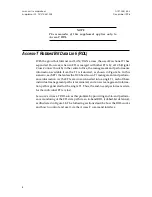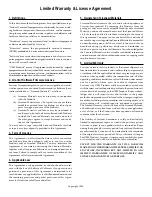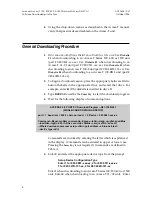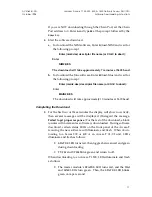
RDL Menu Options
Table D lists all of the new menu paths supported by the Access-T RDL.
Table D. New Access-T RDL Menu Paths
Menu Path
Options/Results
ALARMS—SETUP—DTE—PORT 1 LOF—ENABLE
ALARMS—SETUP—DTE—PORT 1 LOF—DIAL
ALARMS—SETUP—DTE—PORT 1 REMOTE—ENABLE
ALARMS—SETUP—DTE—PORT 1 REMOTE—DIAL
NO, YES
NO, YES
NO, YES
NO, YES
DTE—DTE PORT—RDL
OFF, XTRA DS0, ROBBED BIT
TEST—LINE LOOP—REMOTE-UP
TEST—LINE LOOP—REMOTE-DOWN
T1E1P, T1E1L, FDL, LINE, RDL
T1E1P, T1E1L, FDL, LINE, RDL
REPORTS—CONFIGURATION—RDL
REPORTS—DESCRIPTION—RDL
REP ORTS—24-HOUR REGISTERS—RDL LOCAL
REPORTS—24-HOUR REGISTERS—RDL REMOTE
REPORTS—24-HOUR REGISTERS—RDL TELCO
REPORTS—24-HOUR REGISTERS—RDL USER
REPORTS—ONE-HOUR STATISTICS—RDL LOCAL
REPORTS—ONE-HOUR STATISTICS—RDL REMOTE
REPORTS—ONE-HOUR STATISTICS—RDL TELCO
REPORTS—ONE-HOUR STATISTICS—RDL USER
REPORTS—ESF ERROR COUNT—RDL TELCO
REPORTS—ESF ERROR COUNT—RDL USER
Far-end configuration display via RDL
Far-end description display via RDL
Display showing the 24-hour count
of the specified register type
∆
in 96 15-minute time intervals.
Display showing the one-hour count
of the specified register type
∆
in 4 latest 15-minute intervals.
Displays the number of recorded
ESF errors received at the
specified register
COMMANDS—CLEAR REGISTERS—RDL LOCAL
COMMANDS—CLEAR REGISTERS—RDL REMOTE
COMMANDS—CLEAR REGISTERS—RDL USER
COMMANDS—CLEAR ESF ERRORS—RDL USER
Clears the specified register group
Clears the specified ESF error count
∆
One of the following register types: Errored Seconds, Bursty Errored Seconds, Severely Errored
Seconds, Unavailable Seconds, Loss of Frame Count
ACST-0351-S53
Larscom Incorporated
December 1996
Supplement 3, ACST-0351-005
15
















































